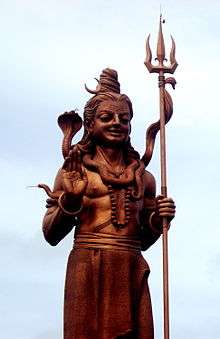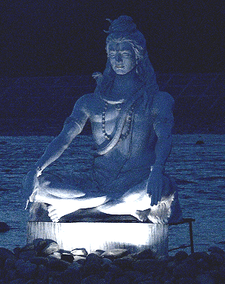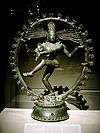Shiva Sahasranama
The Shiva sahasranama is a "list of a thousand names" of Shiva, one of the most important deities in Hinduism. In Hindu tradition a sahasranama is a type of devotional hymn (Sanskrit: stotra) listing many names of a deity. The names provide an exhaustive catalog of the attributes, functions, and major mythology associated with the figure being praised. The Shiva Sahasranama is found in Shiv Mahapuran and many other scriptures such as Linga Purana. As per Shiv Mahapuran when Vishnu was unable to defeat the demons after many attempts he prayed to Shiv who granted him the Sudarshan Chakra for fighting the demons.
Variations
There are at least eight different variations of the Shiva Sahasranama[1] while the one appearing in the Book 13 (Anushasana Parva) of the Mahabharata is considered as the main version.[2] One version is contained in the Linga Purana while another version occurs in the Mahabharata.
The overlapping of names with the Vishnu sahasranama has led Adi Shankara to conclude that Shiva and Vishnu are identical and both equal to monotheistic God, a conclusion that is now a central tenet of Advaitan or Smarta Hinduism.
Also other names of Shiva were told by Krishna himself to Yudhisthira in the Mahabharata. Additionally, Krishna himself also recited another version of the Shiva Sahasranama, the 1008 names of Shiva, to him in the 17th chapter of Anushāsanaparva in the epic Mahabharata,
- Linga Purana (version 1, LP 1.65.54-168) is close to the Mahabharata Anushasanaparvan version.
- Linga Purana (version 2, LP 1.98.27-159) has some passages in common with LP version 1, but also with other sources
- Shivapurana 4.35.1-131.
- Mahabharata (Śāntiparvan version). The critical edition of the Mahabharata does not include this version; it is considered part of book 12 (Śāntiparvan), but is relegated to Appendix 28 in the critical edition, representing a late addition to the text. The Gita Press edition restores it as part of the main text, as verses 12.284.68-180.
- Vayu Purana (1.30.179-284) is almost the same as the Mahabharata Śāntiparvan version.
- Brahmanda Purana (38.1.1-100) is almost the same as the Vayu Purana version.
- Mahābhāgavata Upapurana (67.1-125) appears to be of comparatively recent origin.
 Mauritius. Shiva. You know the rest.
Mauritius. Shiva. You know the rest.

References
- Sharma, pp. viii-ix.
- Mahabharata 13.17 translated by Kisari Mohan Ganguly (published between 1883 and 1896). This is the source for the version presented in Chidbhavananda, who refers to it being from the Mahabharata but does not explicitly clairify which of the two Mahabharata versions he is using. See Chidbhavananda, p.5.

